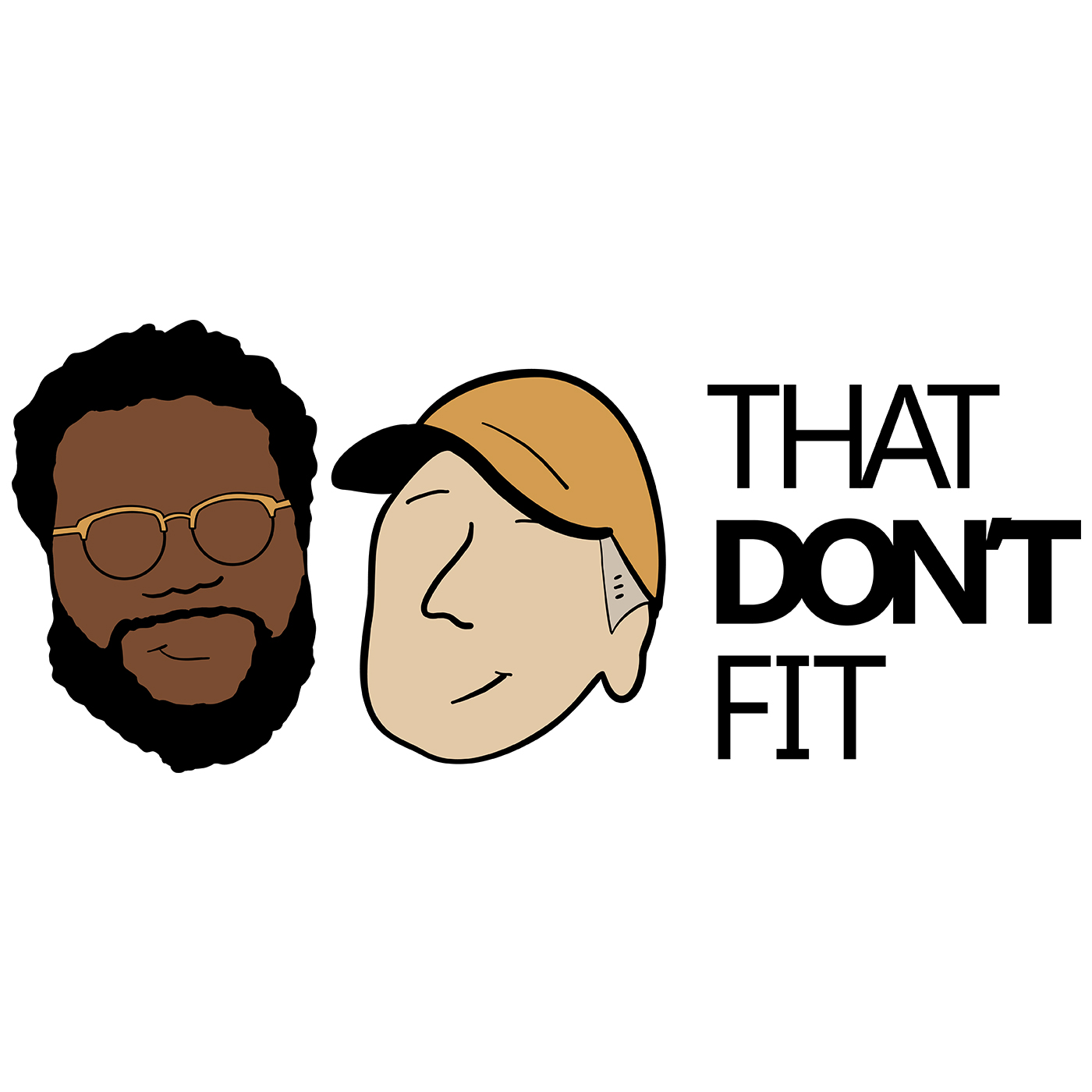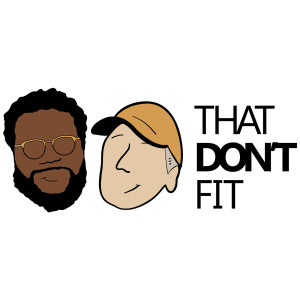
21K
Downloads
56
Episodes
Friends and pastors Jared Torrence & Andy Farmer bring you That Don’t Fit Podcast. They are dedicated to talking about life and life’s real issues that cross racial and generational lines. They are here to help people talk through and process through life in a crazy world.
Episodes

Wednesday Feb 15, 2023
Episode 46: Diversity in Worship
Wednesday Feb 15, 2023
Wednesday Feb 15, 2023
We’re going to be jumping into a little bit of a mini-series in our next few episodes on celebrating ethnic diversity in worship in the church. We’ve got a special guest joining us in the series but want to kick off with a message Andy did on appreciating the cultural and musical styles that come to us as a worshipping church.

Wednesday Jan 25, 2023
Episode 45: The Barrier Breaking Power of the Gospel
Wednesday Jan 25, 2023
Wednesday Jan 25, 2023
We had another conversation ready to drop this week but we felt this January 15 message on Ethnic harmony from Acts 1 was so helpful, so we’re going with it. We’ve also included some elements from the service in celebration of Ethnic Harmony in the church. Enjoy and be inspired!

Wednesday Jan 11, 2023
Episode 44: Let’s Celebrate Ethnic Diversity
Wednesday Jan 11, 2023
Wednesday Jan 11, 2023
Foundations message by JT on the beauty of ethnic diversity in the church.

Wednesday Nov 30, 2022
Episode 43: Ordinary Greatness
Wednesday Nov 30, 2022
Wednesday Nov 30, 2022
In this episode, JT interviews Andy on his new book "Ordinary Greatness: A Life of Elias Boudinot". They talk about Elias, his character, his faith and what we can learn from a man who stood strong amid hard times. The book is available now!
You can buy the book here:
https://www.amazon.com/Ordinary-Greatness-Life-Elias-Boudinot/dp/1585163902

Wednesday Sep 07, 2022
Episode 42: Self Awareness
Wednesday Sep 07, 2022
Wednesday Sep 07, 2022
In this episode, JT and Andy discuss the topic of self awareness and how it's both a positive and negative thing in society.

Thursday Aug 25, 2022
Episode 41: Critical Race Theory
Thursday Aug 25, 2022
Thursday Aug 25, 2022
In this episode, Andy gives a helpful sermon on what critical race theory is and what it means for us as Christians attempting to walk in harmony.
Sermon quotes used:
Voices on Critical Race Theory
Richard Delgado and Jean Stefancic: What do critical race theorists believe? Probably not every member would subscribe to every tenet
set out in this book, but many would agree on the following propositions. First, that racism is ordinary, not aberrational...—“normal science,”
the usual way society does business, the common, everyday experience of most people of color in this country. Second, most would agree
that our system of white-over-color ascendancy serves important purposes, both psychic and material... Because racism advances the
interests of both white elites (materially) and working-class people (psychically), large segments of society have little incentive to eradicate
it... A third theme of critical race theory, the “social construction” thesis, holds that race and races are products of social thought and relations.
Not objective, inherent, or fixed, they correspond to no biological or genetic reality; rather, races are categories that society invents,
manipulates, or retires when convenient... A final element concerns the notion of a unique voice of color. Coexisting in somewhat uneasy
tension with anti-essentialism, the voice-of-color thesis holds that because of their different histories and experiences with oppression, black,
Indian, Asian, and Latino/a writers and thinkers may be able to communicate to their white counterparts matters that the whites are unlikely
to know. Minority status, in other words, brings with it a presumed competence to speak about race and racism. (Critical Race Theory - An
Introduction. 6-9
Janel George: CRT is not a diversity and inclusion “training” but a practice of interrogating the role of race and racism in society that
emerged in the legal academy and spread to other fields of scholarship. (Kimberlé) Crenshaw—who coined the term “CRT”—notes that CRT is
not a noun, but a verb. It cannot be confined to a static and narrow definition but is considered to be an evolving and malleable practice. It
critiques how the social construction of race and institutionalized racism perpetuate a racial caste system that relegates people of color to the
bottom tiers. CRT also recognizes that race intersects with other identities, including sexuality, gender identity, and others. CRT recognizes
that racism is not a bygone relic of the past. Instead, it acknowledges that the legacy of slavery, segregation, and the imposition of second-
class citizenship on Black Americans and other people of color continue to permeate the social fabric of this nation. (https://
www.americanbar.org/groups/crsj/publications/human_rights_magazine_home/civil-rights-reimagining-policing/a-lesson-on-critical-race-
theory/)
Neil Shenvi and Pat Sawyer on essential elements of Critical Theory:
1. Our identity as individuals is inseparable from our group identity and, in particular, whether we are members of a dominant, ‘oppressor’
group or a subordinate, ‘oppressed’ group.
2. Oppressor groups subjugate oppressed groups by dictating and maintaining society’s norms, traditions, expectations, and ideologies.
3. Our fundamental moral duty as human beings is to work for the liberation of oppressed groups.
4. To these core commitments, critical theorists often add several corollaries:
• Subjective, ‘lived experience’ is more important than objective evidence and reason in understanding oppression.
• Privileged groups promote their own agenda under the guise of objectivity.
• Individuals who are part of more than one oppressed group experience ‘intersectionality;’ their oppression is qualitatively distinct
from the oppression of the separate groups to which they belong.
https://freethinkingministries.com/critical-theory-christianity/
Samuel Kronen and Nate Hochman: (CRT’s) core claims are that racism, whether overt or systemic, lies at the root of all racial disparities;
that race and racism shape our political and personal lives; and that the dominant group in society – in this case whites – have a hidden
psychological, political, and economic investment in maintaining their privilege at the expense of minorities. Some other principles
include intersectionality, the idea that human beings are composed of a multitude of intersecting group identities, some of which are
Andy Farmer 3 of 4
2022.05 Critical Race Theory and Covenant Fellowship Church
considered victims and others oppressors; standpoint epistemology, the notion that our racial identity informs our worldview in ways that are
less accessible to those of other backgrounds; and differential racialization, the attempt to grapple with the different ways that a group has
been “racialized” at different times in history to the benefit of the majority culture. In essence, critical race theorists look at two indisputable
facts – that the United States of America was historically racist and that racial gaps between whites and blacks persist – and then seek to
unearth the connection between these two realities by deconstructing the complex interplay between privilege, identity, and structural
oppression. The question is not whether these facts are related, but how they are related. (https://www.acton.org/religion-liberty/volume-33-
number-1/critical-race-theory-un-american)
Susan Stryker: “Because members of minority groups are, by definition, less common than members of majority groups, minorities often
experience misunderstanding, prejudice, and discrimination. Society tends to be organized in ways that either deliberately or unintentionally
favor the majority, and ignorance or misinformation about a less common way of being in the world can perpetuate harmful stereotypes and
mischaracterizations. On top of that, society can actually privilege some kinds of people over other kinds of people, with the former
benefiting from the exploitation of the latter: settlers benefited from the appropriation of indigenous lands, slaveholders benefited from the
labor of the enslaved, men have benefited from the inequality of women. Violence, law, and custom hold these social hierarchies in place.”
Transgender History: The Roots of Today’s Revolution, 7-8. Susan Stryker. As quoted by Josh Blount, 11/21
Abby Ferber: Intersectional theories argue that race and gender are intertwined, and neither can be fully comprehended on its own. An
intersectional approach sees race and gender as interacting and inseparable, and intertwined with other identity categories such as age,
sexual identity, class, disability, etc.. Everyone plays a role in the dynamics of privilege and oppression and can work toward creating change
in the ways that systems and institutions are organized to perpetuate inequality. It is only by adopting an intersectional approach, which
examines the ways in which race, gender, and other systems of inequality interact and intersect, as part of what Patricia Hill Collins calls a
matrix of privilege and oppression, that we can fully comprehend and work to develop successful strategies for combating any and all forms
of oppression. (Whiteness Studies and the Erasure of Gender, 2007. P. 268, 280)
Carl Trueman: Critical theory is today a diverse phenomenon that draws deeply and variously on strands of Marxist thought,
psychoanalysis, feminist theory, postcolonialism, poststructuralism, queer theory, and deconstruction. It embraces a variety of such
approaches and continues to develop its conceptual vocabulary and its range of political concerns. Yet at the core of the various approaches of
critical theorists lies a relatively simple set of convictions: the world is to be divided up between those who have power and those who do
not; the dominant Western narrative of truth is really an ideological construct designed to preserve the power structure of the status quo; and
the goal of critical theory is therefore to destabilize this power structure by destabilizing the dominant narratives that are used to justify—
to “naturalize”—it. (The Rise and Triumph of the Modern Self (pp. 225-226)

Thursday Aug 18, 2022
Episode 40: Pan-Tribal Relationships
Thursday Aug 18, 2022
Thursday Aug 18, 2022
In this episode, JT and Andy discuss the value of having relationships with people who think differently than you.

Thursday Jul 14, 2022
Episode 39: Passion vs. Balance
Thursday Jul 14, 2022
Thursday Jul 14, 2022
In this episode, Andy and JT discuss how difficult it is to find balance in the things we are passionate in. Christopher Ash's book "Zeal Without Burnout" is referenced as a helpful resource in this category.

Wednesday May 11, 2022
Episode 38: The Heart of Anger
Wednesday May 11, 2022
Wednesday May 11, 2022
In this episode, Andy and JT dissect the book "The Heart of Anger: How The Bible Transforms Anger In Our Understanding And Experience" by Christopher Ash and Steve Midgley. They also thank you for the kind comments and reviews!

Wednesday Mar 23, 2022
Episode 37: Confronting Trigger Words
Wednesday Mar 23, 2022
Wednesday Mar 23, 2022
In this episode, JT and Andy take on a list of trigger words that are easily misunderstood and they work to define them and categorize them. Hopefully, this can be a resource for you as you hear these commonly used words/phrases.
Please send us trigger words that you'd like us to talk about on facebook/instagram/twitter @ThatDontFit
